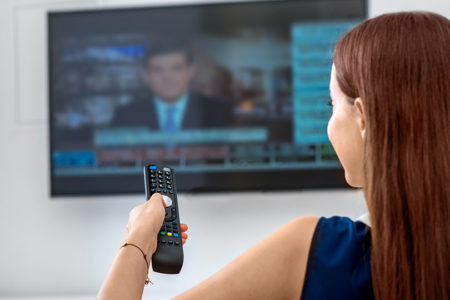Facing the Goliath of the Liberal Media Part One
If you don’t read the newspaper, you are uninformed; if you do read the newspaper you are misinformed. —Mark Twain
With every election, a debate usually rages about whether the major news organizations play fair, are neutral, and present the facts accurately. The last election was no exception. The importance of this issue far transcends partisan bickering. America’s Founding Founders knew full well that a free and honest press was essential for a fully informed electorate. Without it, our constitutional republic would have little chance of meaningful survival.
However, the media’s overt bias (with some exceptions) and manipulation have become so monolithic—so pervasive—that, in my opinion, the situation approaches a constitutional crisis.
What do I mean by liberal media bias? I mean the mainstream national news outlets consistently convey impressions or opinions contrary to the Judeo-Christian view on such ethical, religious, and social issues as the sanctity of human life; the definition of marriage; the right of people to be conservative, biblical Christians and to communicate those beliefs without discrimination; and the right to believe judges should adjudicate those basic questions under the Constitution in a way that secures our religious liberties and basic civil rights.
Furthermore, I define media bias as conveying impressions and opinions of support for those who oppose Judeo-Christian views.
My analysis assumes (correctly, I believe) that, in the last presidential election, U.S. Sen. John McCain—although far from a perfect candidate from the conservative standpoint—was nevertheless more closely aligned with conservative, Bible-believing Christians on certain issues than was U.S. Sen. Barack Obama.1 Thus the extent of the news media’s coverage in favor of now-President Obama is powerful proof of liberal media bias.
The Objective Data
One way to evaluate media bias is to examine whether it is simply an anomaly of one election cycle or one particular phenomenon, or whether it is an entrenched reality of life. A political scientist who analyzed the use of political polls by ABC, NBC, CBS, and FOX News from 1997 to 2008 found a definite “pro-Democrat bias” in the way those polls were used and reported.2
Then there is the study by the Pew Research Center’s Project for Excellence in Journalism. It found that, for the six weeks following the party conventions through the final presidential debates, 36 percent of the news stories portrayed Obama favorably, with a similar percentage neutral. Only 29 percent were negative. The study also showed that a whopping 57 percent of the news about McCain was negative, with only 14 percent positive.3
The Center for Media and Public Affairs of George Mason University obtained similar results. The “big three” television networks (ABC, NBC, and CBS) were found to have skewed their news in favor of Obama. From late August to late September 2008, 61 percent of the stories favored the Democrats and Obama, while only 39 percent favored McCain and the Republicans.4
The Subjective Data
This overt bias was not lost on the public. A staggering 68 percent of the American people in June 2008, the midpoint of the national election campaign, said they believed reporters try to help the candidate whom they want to see win. Further, 44 percent believed most reporters were out to help Obama, while only 13 percent believed reporters were trying to help McCain.5
During the campaign, I mentioned these statistics in a radio debate with Barry Lynn of Americans United for Separation of Church and State. His counterpoint was that the statistics were basically meaningless because they were based on public perception of the news. But in today’s world of journalism, perception is everything. Image is king. The entire advertising industry is built on that philosophy; and, regrettably, it appears the mainstream media is as well.
There is a larger point here also. If voters have an entirely embittered and rightly cynical attitude about the “legitimate” news media, then upon what information will they base their future political, moral, and social opinions? On unsubstantiated rumors? On harebrained urban myths that fly unhindered through cyberspace? If so, then what does this say about the future of America?
Confessions of the Media Elite
Even members of the media elite are becoming embarrassed by this lack of objectivity. Howard Kurtz (CNN/Washington Post media analyst) and Mark Halperin (Time) both commented during the election campaign that the press had a “clear, unambiguous double standard” when it gave Barack Obama an easy pass by not covering his broken campaign promise not to take public campaign funding.6
The ombudsman for The Washington Post, Deborah Howell, was forced to admit in an August 17, 2008, article that Obama had been featured on the front page of her newspaper more than twice as many times as McCain. For Obama, who was a newcomer to the national political scene, such high visibility was essential.
Intentionally or not (I have my own theories), The Washington Post became a de facto member of Obama’s campaign staff. In a belated article on November 9, 2008 (five days after the election), Deborah Howell finally admitted the Post had slanted its coverage to favor Obama, whom the Post had endorsed in its editorial pages.
Then there is CNN. In a telling interview on October 21 with Republican vice presidential candidate Sarah Palin, Drew Griffin made a spontaneous confession. Mrs. Palin pointed to Democratic vice presidential candidate Joe Biden’s statement that if Obama was elected, the international community would quickly mount a crisis against him merely to test his leadership skills. The press largely ignored Biden’s statement. Yet Palin noted that if she had said such a thing, the media would have “clobbered” her with it. Griffin could only laugh and agree. “You’re right. You’re right,” he said.7
However, in that same interview, Griffin made an atrocious misrepresentation when he put an astonishingly hostile question to Gov. Palin. To her face, he “quoted” the National Review as having suggested she was either “incompetent, stupid, unqualified, corrupt, or all of the above.”8 It turns out the National Review used those words all right, but to indict the media, not Sarah Palin. The National Review actually said this: “Watching press coverage of the Republican candidate for vice president, it’s sometimes hard to decide whether Sarah Palin is incompetent, stupid….Palin, the Governor of Alaska, has faced more criticism than any vice-presidential candidate since 1988” (emphasis added).9 The CNN correspondent’s out-of-context use of quotations against Sarah Palin was perhaps one of the most outrageous examples of liberal media bias in the election coverage.
For some veteran journalists, like New York Times columnist Michael Malone, it was simply too much. Said Malone: “I’ve begun—for the first time in my adult life—to be embarrassed to admit what I do for a living.”10
A Single Word
Beyond the distortions of political elections, Christians in particular have a vitally important stake in this debate about the media. It is an interesting fact of history that “the single most influential plea known to the Framers [of the Constitution] for unlicensed access to the printing press” was, according to Archibald Cox (constitutional law professor and first Watergate special prosecutor), none other than John Milton’s Areopagitica (1644).11
Milton, in addition to being a literary genius and political activist in England, was a thoroughgoing Christian. His Christian theology permeated everything he wrote. There is a lesson here for Bible-believing Christians: We must always be vigilant to secure the freedom to tell the truth—including the freedom to decry the American press’s lack of truthfulness. In other words, we must do everything we can to ensure our access to both the print and electronic news media.
One of the best ways to do this is to support alternatives to major networks and the established, elite press. In the world of electronic broadcasting, support Christian radio and television networks and stations. If they are commercial in nature, try to buy products you hear advertised there; then let the station manager know you are doing so. If they are noncommercial/nonprofit, consider giving them a generous financial gift or providing ongoing monetary support.
If you are reading this article, there is a good chance you are already doing something important: you are supporting the alternative Christian press by subscribing to Israel My Glory. Pick one or more Christian print or Web-based sources of information and subscribe, if you aren’t already doing so.
The late Alexander Solzhenitsyn knew something about the skewing of information by a monolithic media organism. In his case, it was the tyranny of the Communist Soviet Union that controlled the media. As a political prisoner confined to an ice-shrouded gulag, Solzhenitsyn could not accept in person the 1970 Nobel Prize for Literature in Stockholm, Sweden. So he wrote his acceptance in an essay that he concluded by recounting a simple but profound Russian proverb about truth. It went like this: One word of truth outweighs the whole world.
Such a formula, he said, is a “seemingly fantastic violation of the law of the conservation of mass and energy.”12 He was speaking of the power of writers. But there is an even greater application for Christians. We have the “one word of truth” that truly outweighs the world, and that Word is Jesus. The gospel truth we have received, believed, and communicate to the world is more powerful than the might of all the media monopolies or transnational telecommunications companies combined.
Jesus, the logos, the Word, came as the Son of God and presented Himself as the embodiment of divine truth. Wherever He is, we are told, there “the light shines in the darkness” (Jn. 1:5). America’s news behemoths boast of being beacons of reliable information. But they have proven to be blind guides. It is time to recognize that Christian alternatives are the last, best hope for telling the truth in America.
Continued next issue
ENDNOTES
- On October 23, 2008, McCain had 63 percent support among “evangelicals”; Obama had 23 percent, according to Christian pollster George Barna. Fox News analysts said the actual vote, based on exit-poll data, supported these figures. Barna polling acquired a slightly different result when it used born again in the question rather than evangelical. See Steve Waldman, “Obama & McCain Tied Among ‘Born Again’ Christians! Says Shocking New Barna Poll,” October 23, 2008 <http://blog.beliefnet.com/stevenwaldman/2008/10/obama-mccain-tied-among-born-a.html>. In my opinion, Barna’s use of the born-again category in a separate question, at least in this election, created an anomaly regarding the results from “born-again” respondents. See also Julia Duin, “Obama’s abortion stance sends young evangelicals to McCain,” The Washington Times, October 30, 2008, A1.
- Vivian B. Martin, “Media Bias: Going Beyond Fair and Balanced,” Scientific American, September 26, 2008 <sciam.com/article.cfm?id= media-bias-presidential-election&print=true>.
- “Winning the Media Campaign: How the Press Reported the 2008 General Election” <journalism.org/print/13307>.
- Jennifer Harper, “Study: Big 3 networks still fixated on ‘first love’ Obama,” The Washington Times, October 14, 2008, National News.
- “Voters Give Media Failing Grades in Objectivity for Election 2008,” June 8, 2008 <rasmussenreports.com/public_content/politics/election_20082/2008_presidential_election/voters_give_media_ failing_grades_in_objectivity_for_election_2008>.
- Noel Sheppard, “Media Bias This Campaign Doing Democracy a Disservice,” October 19, 2008 <newsbusters.org/blogs/noel-sheppard/2008/10/19/halperin-media-bias-campaign-doing-democracy-disservice>.
- “Excerpts from Palin interview with CNN,” October 21, 2008 <cnn.com/2008/POLITICS/10/21/palin.sitroom.transcript>.
- Ibid.
- Byron York, “How Palin Governed,” October 22, 2008 <http://article.nationalreview.com/?q=MjEyMzk3MWU4Yzk1NGQyMWYwZjk0OTcyNmEzYTM5N2E=>.
- Michael Graham, “Election 2008: Objective journalism the loser,” October 28, 2008 <bostonherald.com/news/opinion/letters/view/2008_10_28_Election_2008:_Objective_journalism_the_loser>.
- Archibald Cox, The Court and the Constitution (Boston: Houghton Mifflin, 1987), 187.
- Alexander Solzhenitsyn, Nobel Lecture (New York: Farrar, Straus and Giroux, 1972), 34.







